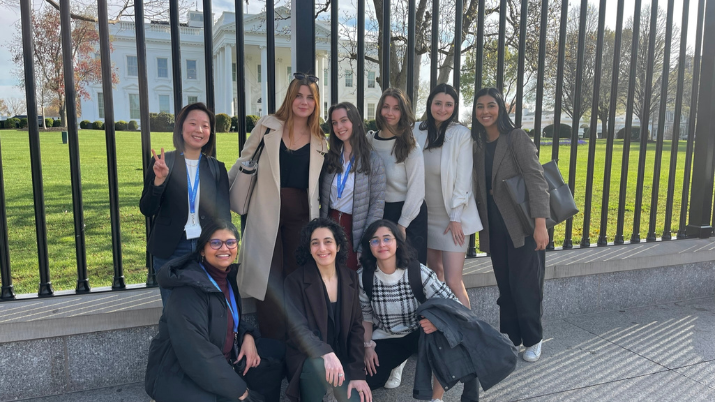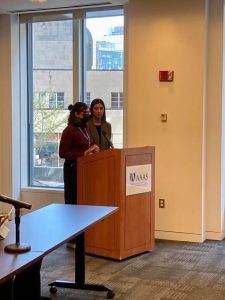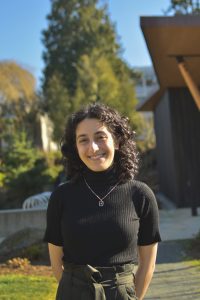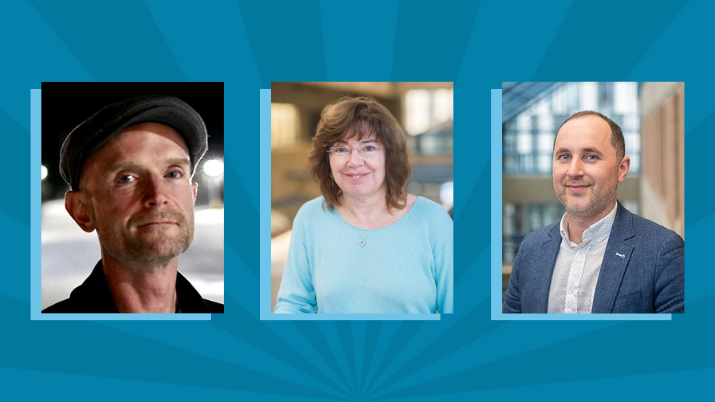

Khushi Mehta (bottom row, left) and Golsa Moazedi (bottom row, middle) with Scholars in Prison Engagementship Team Members.
Psychology undergraduate students are advocating for the rights of wrongfully imprisoned scholars.
As we engage with academia, it is important to recognize that we are part of a global community of students, academics, scholars, researchers, learners, and activists. This community extends far beyond the classroom or lecture hall — and some scholars even face persecution or imprisonment for their work.
Two UBC Psychology undergraduate students, Khushi Mehta and Golsa Moazedi, are working to address these concerns. Khushi and Golsa are advocating to free wrongfully imprisoned scholars and students around the world. They recently travelled to Washington, DC to continue their advocacy and activism in the political mecca. Their work is supported through the Scholars in Prison Engagementship program offered by the UBC Human Rights Collective and housed within UBC’s Office of Regional and International Community Engagement (ORICE) and global community partner, Scholars at Risk (SAR) Network.
  Khushi Mehta (left) is a fifth year undergraduate student majoring in psychology |   Golsa Moazedi is a fourth year undergraduate student majoring in psychology and minoring in law and society |
Khushi and Golsa join us for a Q&A to discuss their work with Scholars at Risk, their engagementship, and their experiences on the recent trip to DC.
Why did you get involved with the Scholars at Risk engagement program?
KM: Most of the cool initiatives I find, I find through Instagram. One of my mutual friends was a part of the Human Rights Collective at UBC last summer and had posted about an engagementship opportunity with the Office of Regional and International Community Engagement on her story. This is how I found out about the opportunity. I chose to apply for it because I have always felt a sense of helplessness when it comes to international-level injustices. When you are faced with a titan of a situation, it is hard to believe that your singular voice will have much of an effect in stopping it. I thought that this program would teach me the necessary skills and allow me to garner enough confidence to scream about the problems we currently face. As a student, ‘academic freedom’ is of paramount importance. It is also something most of us take for granted. But hearing about how people around the world have to struggle to receive a modicum of the freedoms I have, really put into perspective the kind of future I want to chart.
GM: For many years I had been looking around for opportunities to get involved with human rights, specifically exonerating wrongfully convicted individuals. So once I learned of UBC’s Scholars at Risk program last June or so, I was immediately drawn to it and I constantly kept checking ORICE’s social media and website to see when applications would open. The prospect of gaining hands-on experience in advocacy and getting to collaborate with a group of passionate, likeminded UBC students was incredibly exciting to me.
“By learning how to conduct informed activism, my passion for wrongful conviction advocacy has only strengthened through this engagementship and I couldn’t be more grateful for having had this opportunity.”
Who is the imprisoned scholar that you are advocating for?
KM: Having answered this question in so many ways over the past 8 months, I felt like I had a set paragraph I want to speak about. But Ilham Tohti deserves more than a regurgitated response. Ilham Tohti is an Uyghur Muslim who was born and raised in East Turkistan, formally known as the Xinjiang province in China. He is a scholar, author, and economics professor, who used his pen and mind to advocate for the poor treatment the Uyghur community receives in China. His only goal was to see the Chinese government follow through on the promises laid out in their constitution and the Universal Declaration of Human Rights. A couple of months before he was arrested, he had been selected as a visiting scholar at Indiana University and was taking his daughter – Jewherr Ilham – with him to see the campus. Before boarding the plane, he was detained and arrested. Surprisingly, this was not a new encounter for him. He had had skirmishes with law enforcement before, but something felt different this time. In her testimony about this incident, Jewherr recalls her father telling her to escape and live her life. After a private trial, Ilham Tohti was sentenced to life imprisonment, something he chose to be happy about — at least it wasn’t death. While many have forgotten about this case, UBC and the student advocates want to continue working to remind people the importance of individual freedoms, especially within the context of academia under repressive regimes.
GM: My groupmates and I are advocating for the release of two scholars who have been wrongfully detained and sentenced in Iran; Dr. Ahmadreza Djalali and Niloufar Bayani. In 2016, emergency disaster medicine expert and professor Dr. Ahmadreza Djalali travelled to Iran and was arrested by the Iranian authorities under falsified charges of “collaborating with enemy states”. During his illegal detention, Dr. Djalali was held in prolonged solitary confinement and tortured inflicted to coerce a false confession. In 2017, Dr. Djalali was unjustly sentenced to death and he has been awaiting execution for over 5 years now. In 2018, environmental conservationist and activist Niloufar Bayani travelled to Iran with her Persian Wildlife Heritage Foundation colleagues and was arrested by the Iranian authorities under falsified charges of espionage. Held for 22 months of illegal detention, Niloufar experienced mental, physical, and sexual torture inflicted upon her to coerce a false confession. In 2020, Niloufar was unjustly convicted and sentenced to 10 years in the notoriously brutal Evin Prison and she has remained there ever since.
What did you hope to learn or accomplish from your visit to Washington?
KM: I learned how to talk to politicians, how to ask for what advocacy is needed, and the importance of student advocacy. We had the chance to meet with Dr. Peter Biar Ajak. He is a prominent civil society leader and a scholar from South Sudan who was imprisoned for 18 months because advocated for free and fair elections. His release was instigated by student protests across the world, which eventually pressured the South Sudanese government enough to release him. His story drilled in the importance of both the individual and the collective. Feeling shame for not doing enough is not helpful to anyone. Instead, we should witness and remember the injustices if we are unable to participate in advocacy efforts. For instance, it would not be helpful to advocacy efforts if Ilham Tohti’s name was forgotten. Most oppressors are banking on the people forgetting about their repression. This is why we must witness and remember.
GM: As Canadians speaking with American government representatives and human rights organizations, we really wanted to stress how the pursuit of upholding human rights is truly an international effort. Nilloufar Bayani and Dr. Ahmadreza Djalali’s cases are not isolated incidents as many other scholars worldwide are being unjustly detained and stripped of their freedoms. From this experience, we absolutely learned what advocacy strategies and methods would be most effective in advocating for these scholars, particularly when interacting with influential individuals who can leverage their platforms to draw attention to these issues.
Was there anything that surprised you on the trip?
KM: The original plan was to advocate on behalf of Ilham Tohti at Parliament Hill in Ottawa. As we are constituents in Canada, it would have had more of an impact to rally our own politicians behind his cause. However, due to unforeseen circumstances, we had the opportunity to go to D.C. instead. This was both a boon and a curse – while we got to advocate to a much larger political power, we had lesser power to ask for concrete deliverables as we were international students. Therefore, the fact that we had the opportunity to meet with 3 U.S. Senators was a huge surprise. And even more surprising was how interested all of them were in our cause. The future of politics and advocacy is the youth. Most adults do not take us seriously, so when we were sitting in front of a senator’s team, fluently speaking about why Ilham Tohti deserves more advocacy efforts, I felt pride to represent my generation.
“All over the world we are seeing student led movements causing change or raising awareness, and I was surprised that I got to be a part of it.”
GM: As part of the conference, we had the opportunity to speak with some individuals from human rights organizations and the conversations we had really struck me emotionally. I think that surprised me more than anything because I had not anticipated being moved to such an extent. The discussions shed even more light on the unfathomable distress these scholars and their families have gone through on a daily basis. Hearing about the organizations’ and other student advocates’ involvement in these cases, the progress made, as well as the setbacks faced over the years, intensified our group’s sense of urgency to help in the pursuit of securing the freedom of these scholars.
What advice do you have for other students who want to get involved?
KM: I believe that when it comes to advocacy efforts, especially in the real of human rights, you don’t need previous experience. It does not matter where you start if you are open to learning from others. Also, this work is strenuous and stressful. It is okay if you want to take a step back every once in a while. Advocacy is not a sprint; it is a marathon. And lastly, self-doubt is inevitable, but don’t let it stop you from doing what is right.
GM: Do it! If you are passionate about human rights, academic freedom, and international advocacy, absolutely get involved. A piece of advice I’d give is to be open to international collaboration with students from Scholars at Risk programs all around the world to strengthen advocacy for the cases. By connecting with the American students involved in Niloufar Bayani and Dr. Ahmadreza Djalali’s cases, we were able to support one another in our advocacy actions and discussions with government representatives. The more you work together, the more you can achieve!
Thank you so much to Khushi and Golsa for joining us for this Q&A, and for all of the important work they are doing!
Scholars at Risk (SAR) is an international network of institutions and individuals whose mission it is to protect scholars and promote academic freedom. The Scholars in Prison Engagementship program is a two semester engagement. In semester one, students engage in in-depth research on their assigned scholar, investigating the political, legal and social contexts related to their imprisonment. At the same time, they analyze key advocacy already undertaken by other human rights actors who have also advocated on these cases. Finally, students will establish media monitoring protocols to aid SAR in their human rights monitoring and reporting. The above will result in a substantial deliverable in the form of a human rights dossier that will be included in the scholars file at SAR. In semester two, students will engage in a scholarly informed mode of advocacy on behalf of their scholar(s) and complete formal monitoring and evaluation of their work. The engagementship is a two-term program which began in September 2022. Students in this engagementship have been engaged in research and scholarly informed activism in support of freeing wrongfully imprisoned scholars and students around the world. In the annual report by Scholars at Risk’s Academic Freedom Monitoring Project, the Free to Think Report 2022 highlights the Scholars in Prison project of which UBC students in this program are part of a collective effort of advocacy.
1. Sign the open letter to urge the Canadian government to take a strong stance and pressure the Iranian authorities to release Dr. Djalali immediately.
2. Sign the fastaction to urge the Iranian authorities to immediately release Niloufar, and, pending such action, ensure her wellbeing.
3. Follow @ubc_sar on Instagram and share their recent posts to spread awareness of academic freedom


